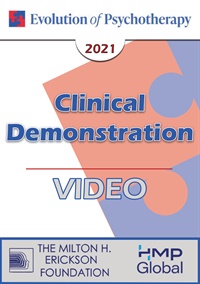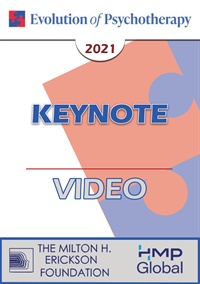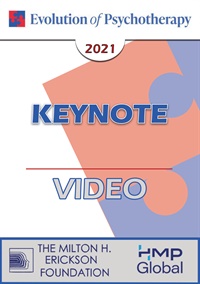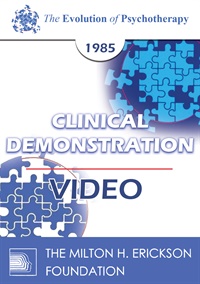- Average Rating:
- Not yet rated
- Topic Areas:
- Clinical Demonstrations | Generative Psychotherapy | Psychotherapy | Art and Creativity
- Categories:
- Evolution of Psychotherapy | Evolution of Psychotherapy 2021
- Faculty:
- Stephen Gilligan, PhD
- Course Levels:
- Master Degree or Higher in Health-Related Field
- Duration:
- 1 hour
- Format:
- Audio and Video
- Original Program Date:
- Dec 02, 2021
- Short Description:
- "This demonstration will show how activating a client's creative process is the key factor in generative psychotherapy. This process follows these steps: (1) Opening a creative safe space (2) Identifying a goal (A positive change or transforming a negative pattern) (3) Identifying and welcoming both obstacles and resources (4) Weaving and integrating the parts into a new "mosaic of self" (5) Orienting to future application of changes. Therapy is successful when clients are able to experientially realize positive life changes. While the identification and transformation of symptoms is important in this regard, the activation of the client's creative capacity to change is even more important. This paper outlines 6 steps in this therapeutic process: (1) opening a mindful field, (2) setting positive intentions, (3) developing and maintaining a creative state, (4) identifying a "storyboard" for achieving goals, (5) transforming negative experiences, and (6) everyday practices. Metho
- Price:
- $59.00 - Base Price
- Average Rating:
- Not yet rated
- Topic Areas:
- Art and Creativity | Keynotes | Psychotherapy
- Categories:
- Evolution of Psychotherapy | Evolution of Psychotherapy 2021
- Faculty:
- Irvin Yalom, PhD
- Course Levels:
- Master Degree or Higher in Health-Related Field
- Duration:
- 1 hour
- Format:
- Audio and Video
- Original Program Date:
- Dec 01, 2021
- Short Description:
- A Keynote featuring Irvin Yalom, PhD, from the 2021 Evolution of Psychotherapy Conference.
- Price:
- $59.00 - Base Price
- Average Rating:
- Not yet rated
- Topic Areas:
- Art and Creativity | Keynotes | Therapist Development
- Categories:
- Evolution of Psychotherapy | Evolution of Psychotherapy 2021
- Faculty:
- Rob Kapilow
- Course Levels:
- Master Degree or Higher in Health-Related Field
- Duration:
- 1 hour
- Format:
- Audio and Video
- Original Program Date:
- Dec 02, 2021
- Short Description:
- "At the heart of psychotherapy is the idea that listening to someone is an inherently healing act. Can an understanding of the grammar of music help us better understand the grammar of how therapists can listen better and even advance therapeutic communication? Join NPR and PBS commentator Rob Kapilow a conductor/composer/author for a unique interactive exploration inside the language of music to see how it can help us learn to listen and communicate. Conducted by Kapilow musicians will play the final two movements of Haydn’s string quartet op 76/5. Learn to listen like Haydn. Learn the evocative grammar that underlies music.
- Price:
- $59.00 - Base Price
- Average Rating:
- Not yet rated
- Topic Areas:
- Clinical Presentations | Art and Creativity | Hypnotherapy | Psychotherapy
- Categories:
- Evolution of Psychotherapy | Evolution of Psychotherapy 1985
- Faculty:
- Ernest Rossi, PhD
- Course Levels:
- Master Degree or Higher in Health-Related Field
- Duration:
- 59:55
- Format:
- Audio and Video
- Original Program Date:
- Dec 11, 1985
- Short Description:
- Clinical Presentation 05 - Facilitating "Creative Moments" in Hypnotherapy featuring Ernest L Rossi, PhD.
- Price:
-
Sale is $29.00
price reduced from Base Price - $59.00
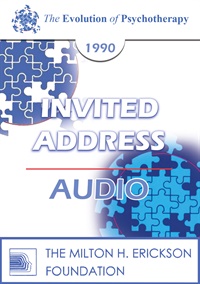
- Average Rating:
- Not yet rated
- Topic Areas:
- Invited Addresses | Buddhism | Meditation, Spirituality and Yoga | Ericksonian Hypnosis and Therapy Techniques | Psychotherapy | Strategic Therapy | Art and Creativity
- Categories:
- Evolution of Psychotherapy | Evolution of Psychotherapy 1990
- Faculty:
- Jay Haley, MA | William Glasser, MD
- Duration:
- 1 Hour 16 Minutes
- Format:
- Audio Only
- Original Program Date:
- Dec 12, 1990
- Short Description:
- A presentation of the influence upon therapy, particularly Strategic Therapy of Zen Buddhism. Similarities between therapeutic change and spiritual enlightenment are discussed in terms of the relationship between Master and trainee and therapist and client. The use of directives, of riddles, of absurd tasks, and the types of single interventions and paradoxical procedures are discussed. Examples of cases and Zen stories are compared. Zen, systems theory, and Erickson's strategic therapy are brought together.
- Price:
- $15.00 - Base Price
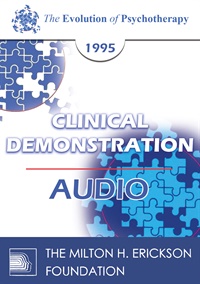
- Average Rating:
- Not yet rated
- Topic Areas:
- Clinical Demonstrations | Hypnotherapy | Interviewing | Psychotherapy | Art and Creativity
- Categories:
- Evolution of Psychotherapy | Evolution of Psychotherapy 1995
- Faculty:
- Ernest Rossi, PhD
- Duration:
- 57 Minutes
- Format:
- Audio Only
- Original Program Date:
- Dec 15, 1995
- Short Description:
- Educational Objectives: To describe the three-step Basic Accessing Question to facilitate reactive reorganization of the problem. To demonstrate two variations of the Basic Accessing Question in Depth Psychotherapy.
- Price:
- $15.00 - Base Price
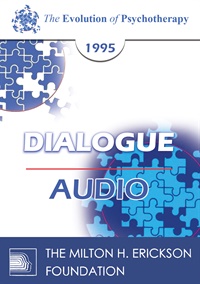
EP95 Dialogue 02 - New Approaches to Creative Psychotherapy - Eugene Gendlin, PhD; Ernest Rossi, PhD
- Average Rating:
- Not yet rated
- Topic Areas:
- Dialogues | Psychotherapy | Art and Creativity
- Categories:
- Evolution of Psychotherapy | Evolution of Psychotherapy 1995
- Faculty:
- Eugene Gendlin, PhD | Ernest Rossi, PhD
- Duration:
- 1:01:13
- Format:
- Audio Only
- Original Program Date:
- Dec 15, 1995
- Short Description:
- Dialogue 02 from the Evolution of Psychotherapy 1995 - New Approaches to Creative Psychotherapy, featuring Eugene Gendlin, PhD; and Ernest Rossi, PhD.
- Price:
- $15.00 - Base Price
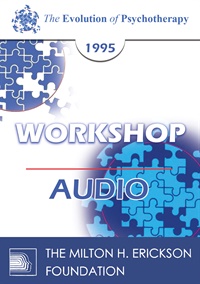
- Average Rating:
- Not yet rated
- Topic Areas:
- Workshops | Art and Creativity | Social Issues | Depression | Religion | Psychotherapy
- Categories:
- Evolution of Psychotherapy | Evolution of Psychotherapy 1995
- Faculty:
- James Hillman, PhD
- Duration:
- 2 Hours
- Format:
- Audio Only
- Original Program Date:
- Dec 14, 1995
- Short Description:
- This workshop is a phenomenology of melancholy. Jungian approaches to depression; clinical treatments, societal implications, resistances, suicidal risks and practical techniques will be demonstrated. The 50-minute, prizewinning BBC Documentary "Kind of Blue," narrated by the presenter will be featured.
- Price:
- $15.00 - Base Price
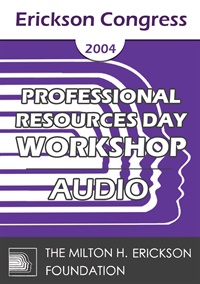
- Average Rating:
- Not yet rated
- Topic Areas:
- Workshops | Improvisation | Therapist Development | Art and Creativity
- Categories:
- Erickson Congress | Erickson Congress 2004
- Faculty:
- Robert Schwarz, PsyD
- Duration:
- 1:32:01
- Format:
- Audio Only
- Original Program Date:
- Dec 01, 2004
- Short Description:
- Increase your ability to improvise and think creatively on the spot. Rejuvenate your ability to find the humor and imaginative spark in all types of situations. In this almost totally FUN and experiential workshop participants will learn a variety of exercises from improvisational comedy and acting that will stimulate their own consciousness of inventiveness. A great way to supercharge yourself for the rest of the Congress.
- Price:
- $15.00 - Base Price
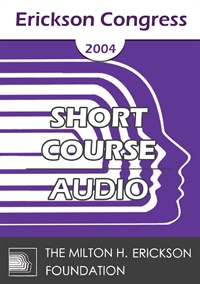
- Average Rating:
- Not yet rated
- Topic Areas:
- Short Courses | Ericksonian Psychotherapy | Interspersal | Tailoring | Utilization | Art and Creativity | Trance | Ericksonian Hypnosis and Therapy Techniques | Music
- Categories:
- Erickson Congress | Erickson Congress 2004
- Faculty:
- Maria Escalante de Smith, MA
- Duration:
- 1:18:14
- Format:
- Audio Only
- Original Program Date:
- Dec 02, 2004
- Short Description:
- Ericksonian psychotherapy emphasizes the importance of tailoring. In this workshop, we will learn how to utilize sung trances where the client's own vocabulary, interspersal and future orientation will be used. Brief interventions will be presented while using sung trances and participants will learn how to compose their own interventions using music and hypnotic language. Audience participation will be invited.
- Price:
- $15.00 - Base Price
Please wait ...


